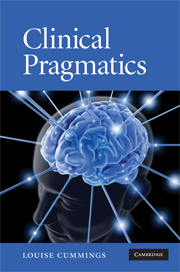Book contents
- Frontmatter
- Contents
- Preface
- Acknowledgements
- 1 Clinical pragmatics: theory and practice
- 2 A survey of developmental pragmatic disorders
- 3 A survey of acquired pragmatic disorders
- 4 The contribution of pragmatics to cognitive theories of autism
- 5 The cognitive substrates of acquired pragmatic disorders
- 6 The assessment and treatment of pragmatic disorders
- 7 A critical evaluation of pragmatic assessment and treatment techniques
- Bibliography
- Index
3 - A survey of acquired pragmatic disorders
Published online by Cambridge University Press: 27 July 2009
- Frontmatter
- Contents
- Preface
- Acknowledgements
- 1 Clinical pragmatics: theory and practice
- 2 A survey of developmental pragmatic disorders
- 3 A survey of acquired pragmatic disorders
- 4 The contribution of pragmatics to cognitive theories of autism
- 5 The cognitive substrates of acquired pragmatic disorders
- 6 The assessment and treatment of pragmatic disorders
- 7 A critical evaluation of pragmatic assessment and treatment techniques
- Bibliography
- Index
Summary
Introduction
For a significant number of children and adults, cerebral pathologies and injuries can result in the impairment of previously normal pragmatic language skills. This group of pragmatically impaired individuals includes the fifty-year-old man who has a right-sided cerebrovascular accident and the teenager who is involved in a road traffic accident and sustains a traumatic brain injury. It also includes the adult who develops a brain tumour in the language-dominant left cerebral hemisphere and the sixty-five-year-old woman with the onset of dementia related to Alzheimer's disease. In each of these cases, pragmatic disorder has a clear neurological aetiology – a focal cerebral lesion or a more diffuse pattern of cerebral degeneration is the cause of the individual's problems with the pragmatics of language. However, there is also a sizeable population of adults with schizophrenia in whom severe pragmatic disorder occurs in the absence of a clear aetiology, neurological or otherwise. In this chapter, I conduct a survey of pragmatic disorders in individuals where the onset of the disorder has occurred in adulthood or at least after the period when acquisition of most pragmatic skills has occurred. Specifically, I will examine what is known about the nature and extent of pragmatic disorders in the following five clinical populations: individuals with (1) left-hemisphere damage; (2) right-hemisphere damage; (3) schizophrenia; (4) traumatic brain injury; and (5) neurodegenerative disorders (particularly Alzheimer's disease).
- Type
- Chapter
- Information
- Clinical Pragmatics , pp. 88 - 117Publisher: Cambridge University PressPrint publication year: 2009



